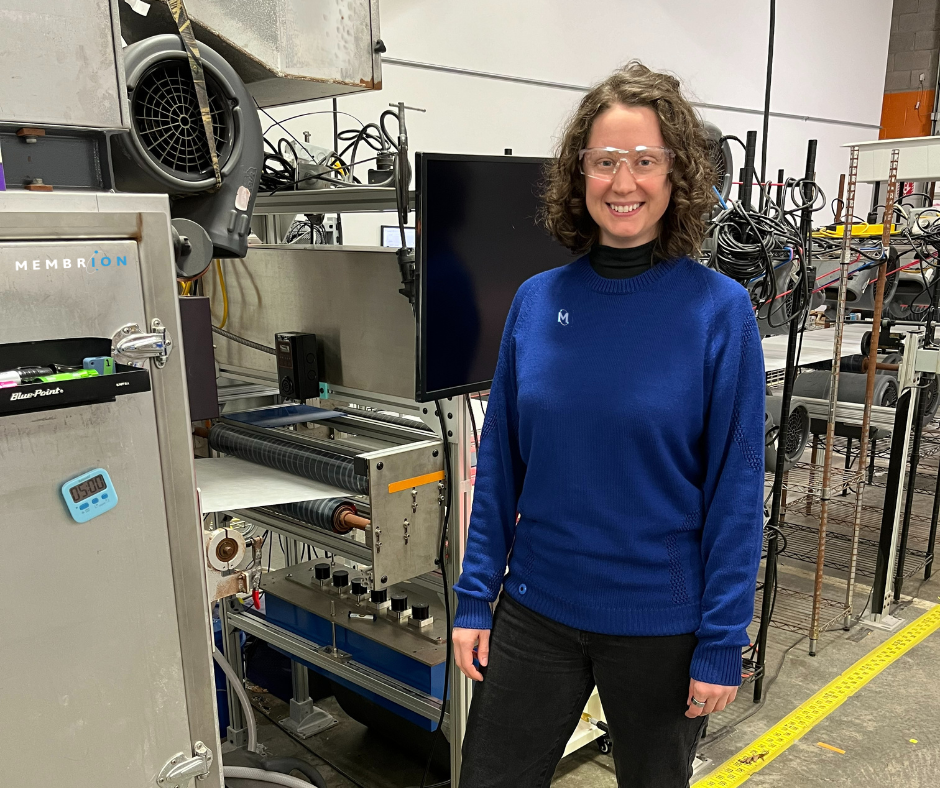Dozens of new membrane technologies are invented at universities every year, but almost all fail to be commercialized – in many cases because of issues that arise during scale-up.
The United States Department of Energy (DOE), Advanced Manufacturing Office (AMO), placed a vote of confidence in Membrion’s ability to solve for membrane quality issues efficiently when they issued a $1.1 million Phase II Small Business Innovation Research (SBIR) grant. The Phase II Award is currently supporting a two-year project to develop, implement, and optimize a machine vision system to provide real time analytics of Membrion’s roll-to-roll ceramic desalination membrane production line.
Many in the membrane manufacturing community have been waiting for a quality control solution like this, and so we’re providing an update as we approach project completion in Q1 ‘24. Leading the project from Membrion’s side is Dr. Olivia Lenz, the principal investigator, with the project collaboration of Jeremy Pearson.
“Our membranes offer compelling reductions in the cost of water desalination, however, continuing to ramp up mass production of a new technology isn’t a trivial task. This DOE grant gives us the resources needed to mass produce high quality membranes that work in harsh environments,” said Greg Newbloom, founder and chief executive officer of Membrion.
New membrane chemistries can offer compelling reductions to the levelized cost of water treatment. However, the lack of existing, adequate, in-line quality control processes is one of the most significant hurdles for new membrane technologies moving from laboratory to commercial production.
In Phase II of the SBIR, Membrion has integrated a technology from the National Renewable Energy Lab (NREL) on our production line and developed image processing software that relies upon machine learning and neural networks (integrating artificial intelligence) to inspect the membrane as it passes through and alert the line operator if the membrane is out of specification. Before, it was a multi-day process to spot check for performance. Phase II is yielding an integrated, live system for securing continuous in-line quality data.
The award benefits not only Membrion, but other manufacturers as well. Since the product can operate in manufacturing facilities with differing environments and conditions, it can be utilized in other facilities and across industries. The award includes a stipend to commercialize the technology and its integrated software.
On completion, Phase II of the inspection system project will allow Membrion to deliver a consistently high-quality ceramic desalination membrane at a lower cost. This work will also deliver benefits across the membrane industry, allowing manufacturers of other technologies to deliver consistent membrane and filter quality. We can have consistently high-quality product because we have the assurance that comes from the data and the AI that learns over time.
In the final stages of the Phase II SBIR, Membrion is refining our work on real-time image processing, defect detection algorithms and marking mechanisms to alert operators if something is outside specification. When asked how broad of an impact this will have on quality and the process of productive, efficient, accurate inspections, Dr. Lenz said, “Before developing this technology, we had a rudimentary system that could not inspect the whole membrane area. It is challenging to quantify the impact in terms of dollars, but in terms of area, we went from only inspecting < 5% of our membrane area to inspecting 100% of the area.”
There is much potential in this extending this application to a variety of industrial coatings. “This could possibly be utilized in other types of coating lines that have materials that do not work well with visible light inspection,” said Dr. Lenz. “The system can be configured in either a transmission or reflection mode, which allows for greater application possibilities.”
Over the next ten years, nearly every state will experience some kind of climate-driven water shortage and dramatic increases in the demand for clean water. Membrion is on a mission to recycle wastewater that was previously too challenging to reuse. Grants like this ensure that we can reach and support the full scale of the problem.

